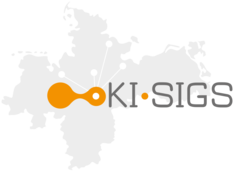KI-SIGS - Artificial Intelligence Space for Intelligent Health Systems
Advancing AI in medicine together
The aim of KI-SIGS is to create a common institutional framework, the "KI-Space", for the model region of Northern Germany. It serves to develop medical AI technologies better and faster and to bring them to application. The central instrument for this is a platform through which knowledge transfer is organised and planned developments are coordinated. In addition, regulatory and ethical guidelines are jointly developed and connections to other networks with AI and medical relevance are made possible.
Market perspective and product promise
With AI-SIGS, a platform is being created on which data and services relating to medical care can be posted and obtained. For the first time, a kind of regional excellence cluster is being created as a community of science, business and medical institutions around AI in medicine. The development of new AI technologies will be closely interlinked with joint business models of these players. Contributions from the participating companies and scientific institutions, fees for services and, in the long term, licensing income from successful product developments will finance the AI Space.
Consortium
UniTransferKlinik GmbH, University of Lübeck, University Medical Centre Hamburg-Eppendorf (UKE), Gesundheit Nord gGmbH Klinikverbund Bremen, Drägerwerk AG & Co. KGaA, IMAGE Information Systems Europe GmbH, Pattern Recognition Company GmbH, mbits imaging GmbH, Philips GmbH, apoQlar GmbH, Söring GmbH, Advanced Bionics GmbH, Stryker Trauma GmbH, szenaris GmbH, Deutsches Forschungszentrum für Künstliche Intelligenz GmbH, Fraunhofer-Gesellschaft zur Förderung der angewandten Forschung eingetragener Verein, University of Bremen, University of Hamburg, Christian-Albrechts-Universität zu Kiel, University Hospital Schleswig-Holstein - Campus Kiel
Challenge and innovation
The healthcare industry is of great economic importance for Germany. Here, AI not only holds direct opportunities in the treatment of diseases, but also for the development of new business fields. However, the potential cannot be raised by activities of individual research institutions or companies in specific medical application fields. KI-SIGS therefore brings together research and practice in the northern German healthcare system in a targeted manner. Requirements from practice are thus taken into account more quickly by research, and clinics, general practitioners and specialist practices through to nursing services benefit from the latest research findings. At the same time, companies and research institutions have the opportunity to expand their position internationally.
Solution approach
The construction of the AI Space is based on three components and three main measures:
First, an AI platform is being developed. It addresses several challenges: connecting the AI-SIGS partners with each other as well as with other relevant networks, sharing AI development building blocks such as source code and documents, and sharing clinical data in a protected space. Regulatory requirements and ethical guidelines for the application of medical AI technologies will also be developed.
Secondly, a joint research and development roadmap will be defined. Three areas have been identified as priority future fields for medical AI technologies: Prevention and prognosis, diagnostics and medical assistance systems. Concentrating on these three areas avoids parallel developments and, by focusing on the common thematic world, facilitates knowledge transfer between the AI-SIGS partners and thus also the feedback process between the projects and the platform. As a result, the platform is continuously optimised, from which projects that are added later benefit.
Thirdly, in order to promote AI innovations and knowledge transfer in the model region, the focus is on cooperation between the actors. To this end, an incentive and remuneration model is being developed for the provision of data and services on the AI platform. In addition, the exchange of experience will be promoted with workshops, competitions and other events and published beyond the consortium.
Use Cases
The collaboration will be tested using concrete medical AI solutions. Nine use cases are being worked on within the framework of the three areas mentioned above, including:
Monitoring of vital parameters (area of prevention and prognostics)
Patients in intensive care units occasionally experience acute failures or reduced cardiac output that the body can no longer compensate for. Machine learning methods are used to investigate whether there are parameter constellations that indicate such complications at an early stage.
Optimal ventilation therapy (area of diagnostics)
The comprehensive assessment of patients is of paramount importance for ventilation therapy. We are therefore investigating how AI can be used to evaluate visual information from depth images of the organs and, in combination with time series of vital parameters, improve diagnostics and therapy.
Movement therapy (area of medical assistance systems)
For many therapies and rehabilitation measures as well as for prevention in old age, professionally guided movement training is indispensable. Within the framework of KI-SIGS, an assistance system is being developed that uses virtual agents and robot systems to provide feedback on the movements performed, thus enabling patients to train independently.
- Recommend this page:
- Print view
